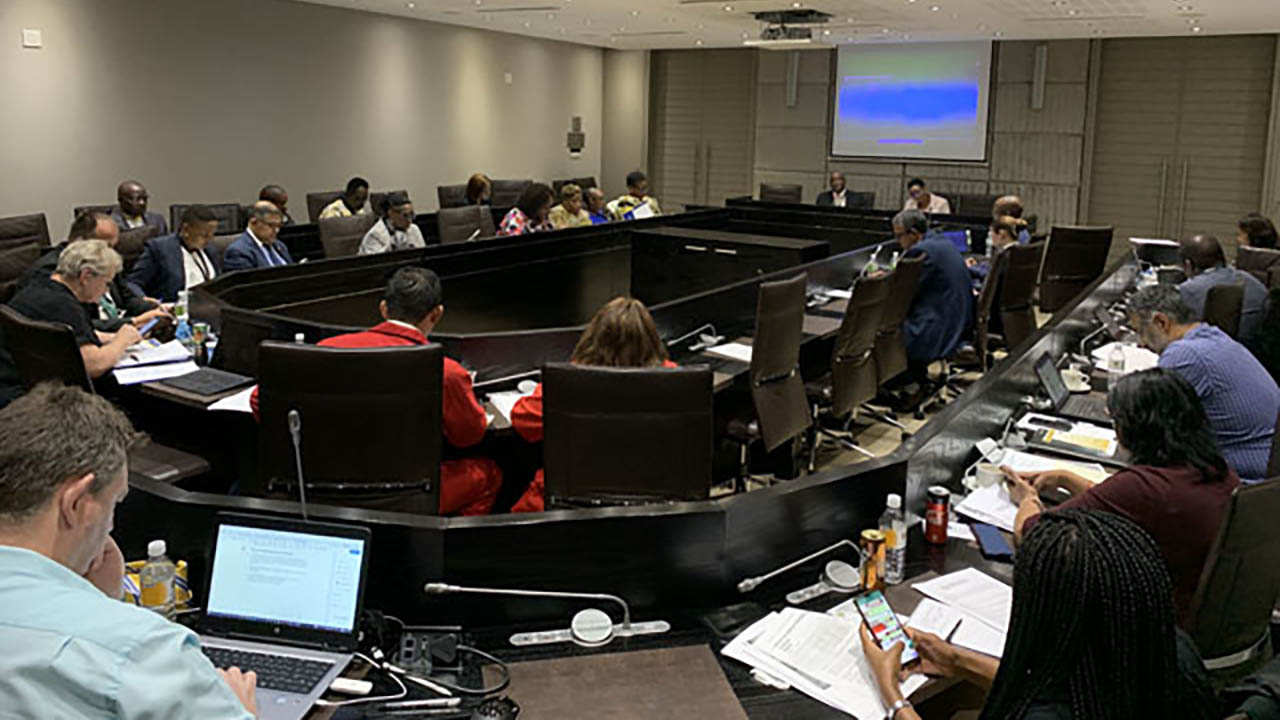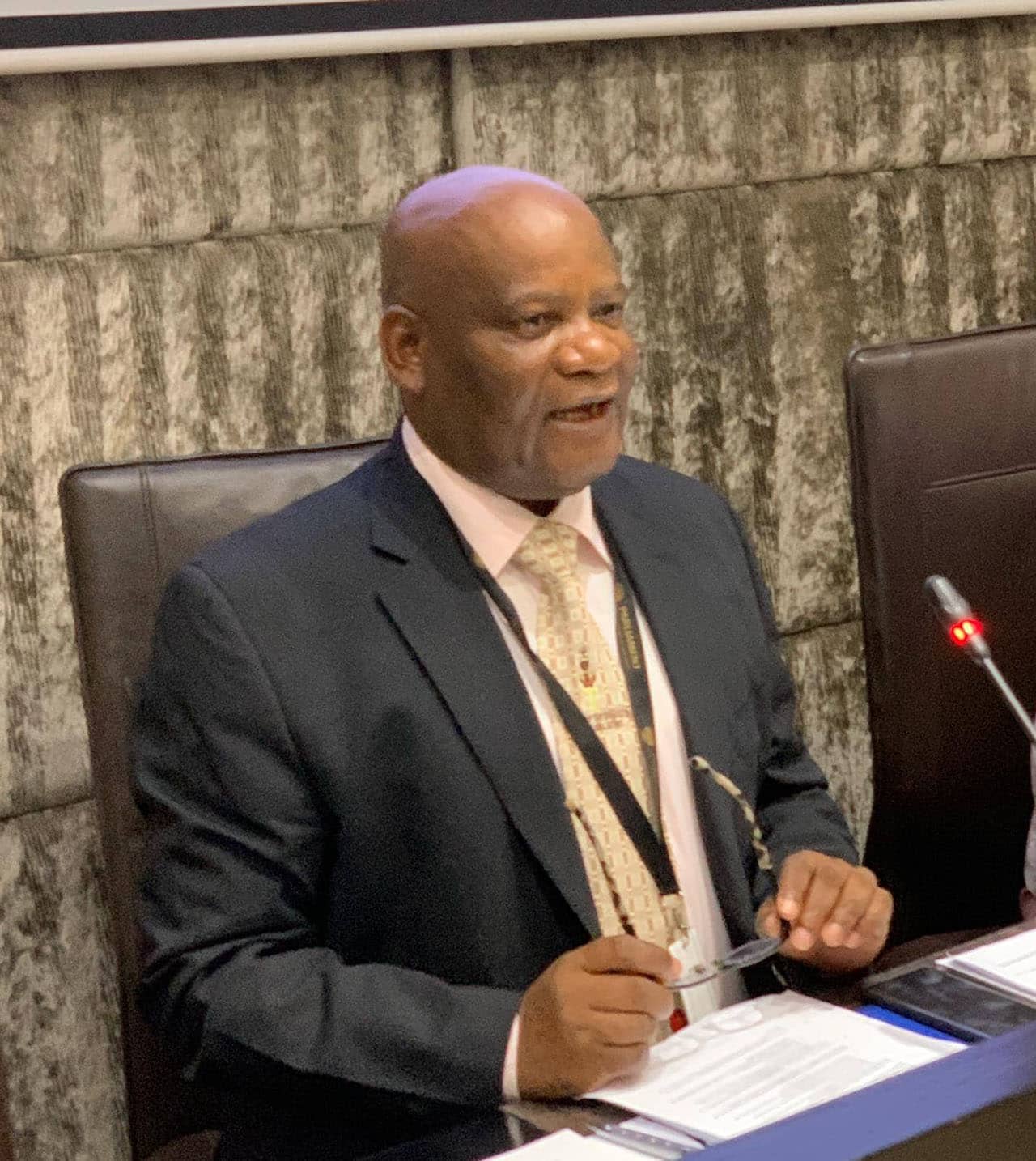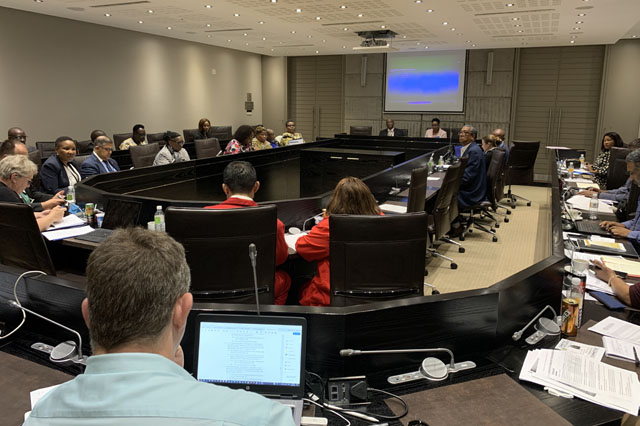
On 10 March 2020, the Parliament of the Republic of South Africa along with PGA hosted a Briefing on Maritime Governance and Sustainable Development, chaired by PGA Member Hon. Fikile Xasa, MP, Chair of the Portfolio Committee on Environment, Forestry & Fisheries. The meeting sought to brief MPs on issues related to improved maritime governance as they relate to the UN Sustainable Development Goals (SDGs), particularly SDG 14: Life Under Water.
The meeting was attended by members of the Portfolio Committee on Environment, Forestry & Fisheries; the Select Committee on Land Reform, Environment, Mineral Resources and Energy; the Portfolio Committee on Women, Youth and Persons with Disabilities; as well as MPs representing local provinces. Participants benefitted from presentations by expert speakers from Abalobi, South African Maritime Safety Authority (SAMSA) and PGA’s Senior Advisor on Oceans. The discussions focused on the implementation of the three international maritime governance treaties: the International Maritime Organization’s Cape Town Agreement (CTA), the International Labour Organization’s Working Fishing Convention (C188), and the UN Food and Agriculture Organization’s Port State Measures Agreement (PSMA).
Ms. Leyla Nikjou, Senior Advisor to PGA’s Ocean Campaign presented an overview of PGA and the Campaign on the Protection of the Oceans and Implementation of SDG 14. She highlighted PGA’s active work in promoting the ratification and implementation of the Three Treaties to End Illegal Fishing, which help build a framework to fight Illegal, Unreported and Unregulated Fishing (IUU) and can have far reaching effects, even outside the fisheries sector. For example:
- Safety at sea
- Livelihood of people working on fishing boats
- Food security
- Small-scale fisheries being outcompeted by illegal fishers
- Rights of fishers using traditional methods
- Women’s rights, many who work in small-scale fisheries are women
- Labor conditions on illegal vessels
South Africa is in a unique position to serve as a model to share lessons learnt and best practices because of South Africa’s has ratification and progress towards implementation of all three of the mentioned maritime governance treaties.
During the ensuing discussion Mr. Narend Singh, MP asked how international law was being monitored and enforced and asked if there were examples of illegal vessels being confiscated in order to protect small-scale fishers from being unable to compete. Ms. Winnie Ngwenya, MP asked what action was being taken to form cooperatives and support small-scale fisheries in coastal areas, and how many are owned by women. Ms. Nikjou highlighted that international regulation was worth little without national implementation, therefore PGA works to invite Parliamentarians to United Nations conferences so they are involved in the process and are able to work towards national implementation and enforcement upon ratification. For example, with the Cape Town Agreement there is an issue of enforcement because of national capacity where even when national laws are implemented there may not be enough capacity to enforce them.
This discussion was followed by a presentation from Dr. Serge Raemaekers, Managing Director of the NGO Abalobi, a mobile app and program that aims to educate and elevate poverty in the small-scale fisheries sector. The presentation included a historical overview and current status of South Africa’s small-scale fisheries. Dr. Raemaekers highlighted one of the big challenges for small-scale fishers is the competition from illegal fishing operations. For example, on the legal international market, South Africa is the smallest exporter of abalone. However, on the illegal market it is the highest exporter reaching as much as 3000-4000 tons of abalone exported yearly.
Mr. Selwyn Bailey, Fishing Safety Specialist from SAMSA then gave a presentation on South Africa’s implementation of the IMO’s Cape Town Agreement and the ILO’s Work in Fishing Convention and how these can help to prevent illegal fishing and labor abuses onboard fishing vessels. He noted that the entry into force of the Cape Town Agreement would be an advantage and would harmonize regulations worldwide, improve safety culture and reduce accidents on fishing vessels. Mr. Bailey also spoke about C188 and the FAO’s PSMA. In the discussion Mr. Nazir Paulsen, MP asked what resources SAMSA was employing to implement the provisions of these treaties, specifically the inspection of 24 meter+ vessels, and asked if and how often SAMSA was in consultation with vessel owners and employers. Mr. Bailey confirmed no change was needed because of the 24-meter requirement as SAMSA was already inspecting these vessels, so no additional resources were required. SAMSA regularly engages with all the actors in the sector including employers and conducts regular inspections with regard to compliance with work condition regulations.
Ms. Makoti Khawula, MP asked questions about how women in the sector were being supported, animal pollution and how the Environmental Department was informing communities and communicating safety information. Mr. Bailey confirmed there were two companies employing women at sea but there were no other fishery companies directly supporting women. The Chair indicates some of Ms. Khawula’s other questions should be directed towards the Committee or Department of Environment.
In his closing remarks, PGA Member Hon. Xasa, MP thanked SAMSA for its role, and PGA for engaging with South Africa to ensure parliamentarians are empowered regarding issues on the protection of oceans and implementation of SDG 14.





